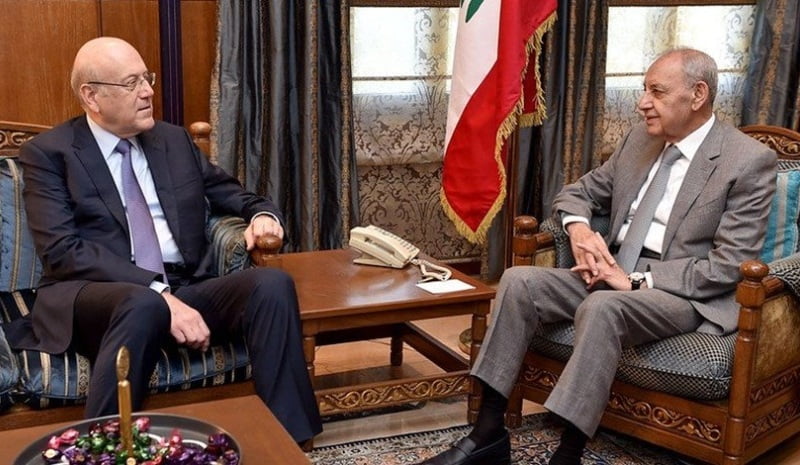
A governmental decision to push daylight savings by a few weeks sends the country in disarray, reopening sectarian divisions in a country whose population is already hanging by a thread.
By Marita Kassis
On Thursday (March 23), Lebanon's caretaker, Prime Minister Najib Mikati, announced that the country would push the start of daylight savings to April 21.
Any legal or administrative clarification did not support the decision. Why would a caretaker government unilaterally postpone observed daylight savings following internationally recognised standards? The conversation between Mikati and the Speaker of Parliament, Nabih Berri was quite interesting.
Following the decision, which shocked the country, the following video was leaked: Berri asked Mikati to postpone daylight savings to allow Muslims in the country, who are currently fasting for the holy month of Ramadan, to break their fast an hour earlier.
The responses to this decision sent the country into total disarray. Many private institutions operating in the international market were forced to adopt daylight savings and thus work an hour ahead of the government’s decision.
Middle East Airlines, Lebanon’s national carrier, immediately sent messages informing departing customers that it would still obey daylight savings in flights while adopting the governmental winter time on its devices. These corporations might be forced to operate at different times due to global commitments.
What did this decision truly do to Lebanon?
At a national level, this disastrous decision has officially cut deeper the sectarian rhetoric that so many have been trying to mend. Although a fury of jokes and memes quickly surfaced on social media, between Berri Mikati Time, Najib Mikati Time, and Christians vs Muslims Time.
The sad reality is that this incomprehensible logic of quickly adopting decisions to please communities over the nation has been every government’s failure in addressing the Lebanese as a united people under the Lebanese constitution.
By deciding to “postpone daylight savings”, a ridiculous notion in and of itself, the two executive leaders have also alienated Lebanon from an international system that has been adopted for years while also politicising the clock.
Lebanon's influential Maronite church - the largest church in the country - on Saturday announced it would not abide by the decision, saying there had been no consultations or considerations of international standards. While several Muslim institutions have announced that they’ll follow the governmental decision to remain in the winter time.
And there goes the sectarian narrative.
This matter, which is far from a political one, was monopolised by the two top offices in the country, knowing that there is no sitting president right now and thus no Christian voice in the office, breaking the National pact of 1943 (in which the president is a Maronite, the speaker a Shiite, and the prime minister, a Sunni).
In this case, the speaker of parliament and the caretaker prime minister decided on the best course of action that would be in the interest of the Muslim sect without considering the threatening repercussions it would have on the Christians, other communities, and Lebanon as a whole.
Caretaker justice minister Henry Khoury, a Christian, said the decision “violated the principle of legitimacy” and resulted in a visible Lebanese rift along sectarian lines. He called on Mikati to reverse the move. This is the first opposing stance to emanate from within the cabinet, where political allegiances mainly follow sectarian religious sides.
Many businesses, including Christian religious authorities and Lebanon’s main TV channels, LBCI and MTV, objected to the decision. They sent memos to their communities informing them they would obey the daylight savings changes and thus adopt the new hour on Saturday night.
Some Muslims were also quick to object to the government’s decision, specifying that fasting, a religious commitment, is not bound by an hour but is strictly linked to sunset and dawn, irrespective of the time zone, difference, or hour.
As ridiculous as it might sound, Lebanon is not only facing an exchange rate with devastating consequences on the purchasing power of most people, but now workers from all sectors need to figure out which time to follow depending on the communal allegiance and political line their offices adhere to, or where they are geographically located.
According to the World Bank Lebanon Economic Monitor released in 2021, Lebanon is facing the possible top 3rd worst economic crisis the world has ever known since the 19th century. A World Bank report depicted the country as a sinking ship accusing its leadership of inadequate responses to the nation’s challenges.
Countless other decisions superseding in urgency and being far more life-threatening to people should have been discussed during that meeting. Nevertheless, the political will to solve Lebanon’s ongoing meltdown is consciously being delayed.
There is a reigning political deadlock coupled with a spiraling economic collapse, a vacant presidential seat since Oct. 31, and a caretaker government that seems to have no political will to execute any needed reform or come up with a suitable plan of action to finalise a deal with the International Monetary Fund.
The country is constantly battling to stay afloat, hanging by every occasion to attract tourists and expats, while facing its biggest immigration wave amid an uncertain future and crushing economic circumstances.
The decision is just another proof of the inadequacy of the political elite in running a country that is barely surviving. Another distraction to keep a population that is sinking in a constant inability to meet adequate living standards, or even provide the basic necessities to their families.
Even daylight saving has taken a sectarian religious angle with politicians pulling strings to please their community - proving that division in Lebanon is a constant threat, the ruling elite is incapable of public service, people are highly politicised in a severely volatile environment, and it takes only one statement to fuel communal & sectarian rhetoric, all this in a country whose sectors are being tested for survival daily.
In complete transparency and a personal disclaimer, I apologise for the communal and divisive language used in this article, a reflection of the public disservice that the political leadership is doing to Lebanon and the catastrophic governance that is forcibly being applied to a nation that is still troubled by memories of a civil war that has tangible and agonising repercussions yet today.






